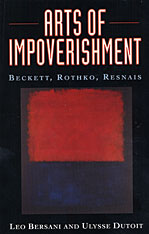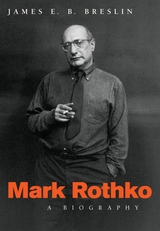
“How almost true they sometimes almost ring!” Samuel Beckett’s character rues his words. “How wanting in inanity!” A person could almost understand them! Why taunt and flout us, as Beckett’s writing does? Why discourage us from seeing, as Mark Rothko’s paintings often can? Why immobilize and daze us, as Alain Resnais’s films sometimes will? Why, Leo Bersani and Ulysse Dutoit ask, would three acknowledged masters of their media make work deliberately opaque and inhospitable to an audience? This book shows us how such crippling moves may signal a profoundly original—and profoundly anti-modernist—renunciation of art’s authority.
Our culture, while paying little attention to art, puts great faith in its edifying and enlightening value. Yet Beckett’s threadbare plays Company and Worstward Ho, so insistent on their poverty of meaning; Rothko’s nearly monochromatic paintings in the Houston Chapel; Resnais’s intensely self-contained, self-referential films Night and Fog and Muriel all seem to say, “I have little to show you, little to tell you, nothing to teach you.” Bersani and Dutoit consider these works as acts of resistance; by inhibiting our movement toward them, they purposely frustrate our faith in art as a way of appropriating and ultimately mastering reality.
As this book demonstrates, these artists train us in new modes of mobility, which differ from the moves of an appropriating consciousness. As a form of cultural resistance, a rejection of a view of reality—both objects and human subjects—as simply there for the taking, this training may even give birth to a new kind of political power, one paradoxically consistent with the renunciation of authority. In its movement among these three artists, Arts of Impoverishment traces a new form of movement within art.

A book of heroic dimensions, this is the first full-length biography of one of the greatest artists of the twentieth century—a man as fascinating, difficult, and compelling as the paintings he produced. Drawing on exclusive access to Mark Rothko's personal papers and over one hundred interviews with artists, patrons, and dealers, James Breslin tells the story of a life in art—the personal costs and professional triumphs, the convergence of genius and ego, the clash of culture and commerce. Breslin offers us not only an enticing look at Rothko as a person, but delivers a lush, in-depth portrait of the New York art scene of the 1930s, ’40s, and ’50s—the world of Abstract Expressionism, of Pollock, Rothko, de Kooning, and Klein, which would influence artists for generations to come.
"In Breslin, Rothko has the ideal biographer—thorough but never tedious, a good storyteller with an ear for the spoken word, fond but not fawning, and possessed of a most rare ability to comment on non-representational art without sounding preposterous."—Robert Kiely, Boston Book Review
"Breslin impressively recreates Mark Rothko's troubled nature, his tormented life, and his disturbing canvases. . . . The artist's paintings become almost tangible within Breslin's pages, and Rothko himself emerges as an alarming physical force."—Robert Warde, Hungry Mind Review
"This remains beyond question the finest biography so far devoted to an artist of the New York School."-Arthur C. Danto, Boston Sunday Globe
"Clearly written, full of intelligent insights, and thorough."—Hayden Herrera, Art in America
"Breslin spent seven years working on this book, and he has definitely done his homework."-Nancy M. Barnes, Boston Phoenix
"He's made the tragedy of his subject's life the more poignant."—Eric Gibson, The New Criterion
"Mr. Breslin's book is, in my opinion, the best life of an American painter that has yet been written . . . a biographical classic. It is painstakingly researched, fluently written and unfailingly intelligent in tracing the tragic course of its subject's tormented character."—Hilton Kramer, New York Times Book Review, front page review
James E. B. Breslin (1936-1996) was professor of English at the University of California, Berkeley, and author of From Modern to Contemporary: American Poetry, 1945-1965 and William Carlos Williams: An American Artist.
READERS
Browse our collection.
PUBLISHERS
See BiblioVault's publisher services.
STUDENT SERVICES
Files for college accessibility offices.
UChicago Accessibility Resources
home | accessibility | search | about | contact us
BiblioVault ® 2001 - 2024
The University of Chicago Press









